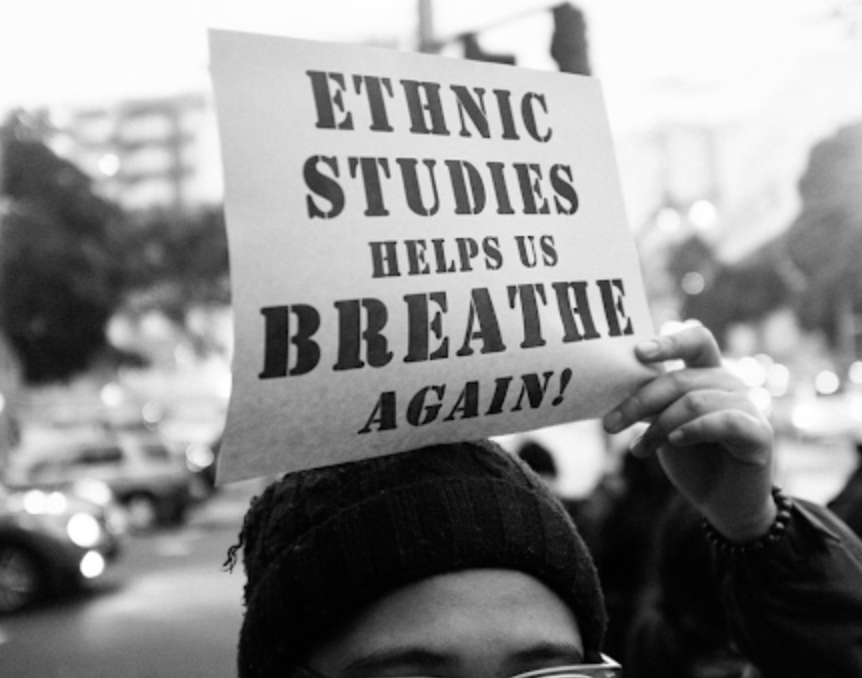What is Ethnic Studies?
by: Larry McDaniel Jr., MS.E.d. (he/him/his)
Professor of Ethnic Studies, Mt. San Antonio College
Ethnic Studies is the critical and interdisciplinary (holistic and intersectional)
study of race, ethnicity, and indigeneity. With a focus on the experiences, voices,
and perspectives of people of color within the United States. Since its emergence in 1968, the discipline has focused on race and racism as moving
targets that mutate over time, and intersect with other modalities of power and systems
of oppression (gender, sexuality, class, religion, citizenship status, etc.). The discipline centers four historically defined racialized groups: Native/Indigenous
Americans, African/Black Americans, Latinx/a/o Americans, and Asian Americans/Pacific
Islanders.
Since its emergence in 1968, the discipline has focused on race and racism as moving
targets that mutate over time, and intersect with other modalities of power and systems
of oppression (gender, sexuality, class, religion, citizenship status, etc.). The discipline centers four historically defined racialized groups: Native/Indigenous
Americans, African/Black Americans, Latinx/a/o Americans, and Asian Americans/Pacific
Islanders.
Though interdisciplinary, Ethnic Studies has its own epistemologies, separate
from other disciplines that may also cover race and ethnicity within their field.
Ethnic Studies does draw from Anthropology, Sociology, History, English, Art history,
Communications, and Political Science; however, at its nucleus, Ethnic Studies is
explicit in its aim to decenter whiteness and white narratives on the American experience,
by centering scholarship and experiences that redefines the lives of people of color
from their own perspectives. It is not about studying people through a eurocentric
gaze, but about people of color determining themselves as the subject of study.
Ethnic Studies is the only academic field that explicitly focuses on racial formation,
race relations and ethnic identity in the U.S. in a way that re-humanizes the four
racialized groups. It forces us to look at a history of power and white supremacy,
and gives us a toolkit to analyze, critique, challenge and disrupt the many forms
of racism that exist today. In addition, Ethnic Studies examines various forms of
institutional violence, including: Land conquest, settler colonialism, U.S. imperialism,
systemic sexual violence, racial genocide, chattel slavery, gendered militarization,
state-sanctioned police violence, state sanctioned judicial violence, legalized discrimination
(segregation), White supremacy, and the internalized logics of gender/racial domination
and assimilation.
Ethnic Studies is also taught from an intersectional lens, meaning that race
and ethnicity are not siloed, but are examined in relation to an axes of power and
identity: Sex, gender, age, religion, immigration status, tribal citizenship, language,
class, national origin, sovereignty, and/or ability.
At its core, Ethnic Studies is a project of resistance, agency, liberation, decolonization,
self-determination, and group affirmation for communities of color. It is a call to
action, to recognize, acknowledge, and close equity gaps for the four historically
defined racialized core groups.
It is concerned with fostering critical antiracist thinking among non-students
of color by presenting non-hegemonic perspectives. It is about addressing generational
trauma related to colonization through reflexive and collective healing, dreaming
and creating anew.It is a strength based discipline, counter to deficit frameworks and instruction.
Ethnic Studies operates holistically from a mental, physical, and spiritually centered
place of well-beingness.
 Despite historically being undervalued, underfunded, challenged, intentionally
falsified, and co-opted, the discipline of Ethnic studies is finally being recognized
by many across the state of California as a core component for holistically developing
our students and fighting against racism in U.S. society.
Despite historically being undervalued, underfunded, challenged, intentionally
falsified, and co-opted, the discipline of Ethnic studies is finally being recognized
by many across the state of California as a core component for holistically developing
our students and fighting against racism in U.S. society.

